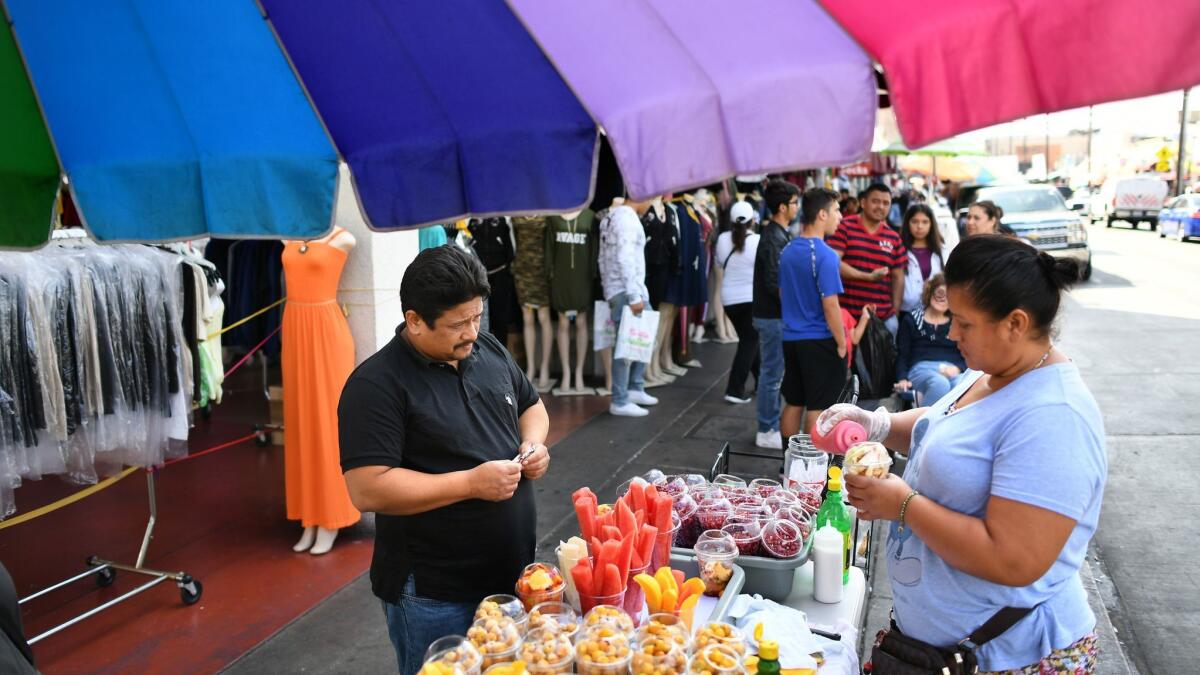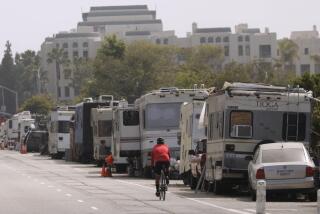L.A. hustles to pass new rules on street vending ahead of new state law

- Share via
Nearly five years after Los Angeles politicians called for the city to legalize selling food and goods on its sidewalks, the City Council is hustling to pass rules before a new law goes into effect across California.
L.A. has already eliminated criminal charges for vending amid fears that they could jeopardize immigrant sellers and put them at risk of being deported, though vendors can still be cited and fined.
Earlier this year, the City Council backed proposed rules that would regulate where and how vendors can do business, asking city lawyers to draft an ordinance for their approval.
But council members have yet to approve a new ordinance that would allow sidewalk sellers to get permits and do business legally.
California has now passed a new law that affects their plans. Senate Bill 946, recently signed by Gov. Jerry Brown, restricts how cities can regulate vending, limiting the kind of rules and punishments they can impose on sidewalk vendors.
Beginning in January, if cities do not have vending regulations that line up with that state law, they cannot enforce local laws against vending.
If Los Angeles does nothing, “it would mean that the city would not have the ability to enforce … any vending violations at all,” though it could enforce other municipal rules against blocking the sidewalk or selling illegal goods, legislative analyst Felipe Chavez said.
That has city leaders hustling to polish off their plans: Council members held a joint meeting of three committees Wednesday to recommend that the city draft a new version of the ordinance by the middle of November.
City attorneys had already drafted a proposed ordinance months ago, but the California law imposed new requirements that the city must now address. At the Wednesday hearing, Councilman Bob Blumenfield said that SB 946 “changes the game quite a bit,” complaining that it was “incredibly limiting for our city.”
For instance, SB 946 says that cities cannot restrict the total number of vendors unless the cap is “directly related to objective health, safety or welfare concerns.”
L.A. had planned to allow only two carts per block on each side of the street in commercial and industrial zones, but Chavez told council members that an across-the-board cap might not be in line with the state law, though the city might be able to justify such restrictions for safety reasons on a case-by-case basis.
City staffers added that the city could instead adopt restrictions on how far apart vendors need to be for safety reasons. Councilman Curren Price asked to include such rules in the new version of the ordinance.
L.A. still plans to ban vending near busy venues such as Dodger Stadium, the Hollywood Bowl, Staples Center, the Coliseum, Universal Studios and the Hollywood Walk of Fame, which had been sought by business groups and corporations such as Anschutz Entertainment Group. Kerry Morrison, who manages Hollywood business improvement districts, said along the Walk of Fame, “the sidewalk has become a gantlet.”
At the Wednesday meeting, council members asked for city attorneys to prepare new findings based on health or safety to prohibit vending in those areas, in order to ensure the rules complied with the state law.
The draft rules also ban vendors from blocking too much of the sidewalk and require them to keep the area clean, among other restrictions. Price said Wednesday that he wanted the city to press forward with plans for a permit system based on location, saying it would give vendors a clear understanding of where they can set up.
Scores of vendors showed up to City Hall on Wednesday to plead for the city to move forward with a permitting system. Faustino Martinez, an ice cream vendor who works in South L.A., asked why the council was taking so long now that Gov. Brown had signed the state law, prompting a burst of applause from the crowd.
“Street vendors don’t want to live in the shadows,” Martinez said. “We want to work in a dignified way.”
Twitter: @AlpertReyes
More to Read
Sign up for Essential California
The most important California stories and recommendations in your inbox every morning.
You may occasionally receive promotional content from the Los Angeles Times.











